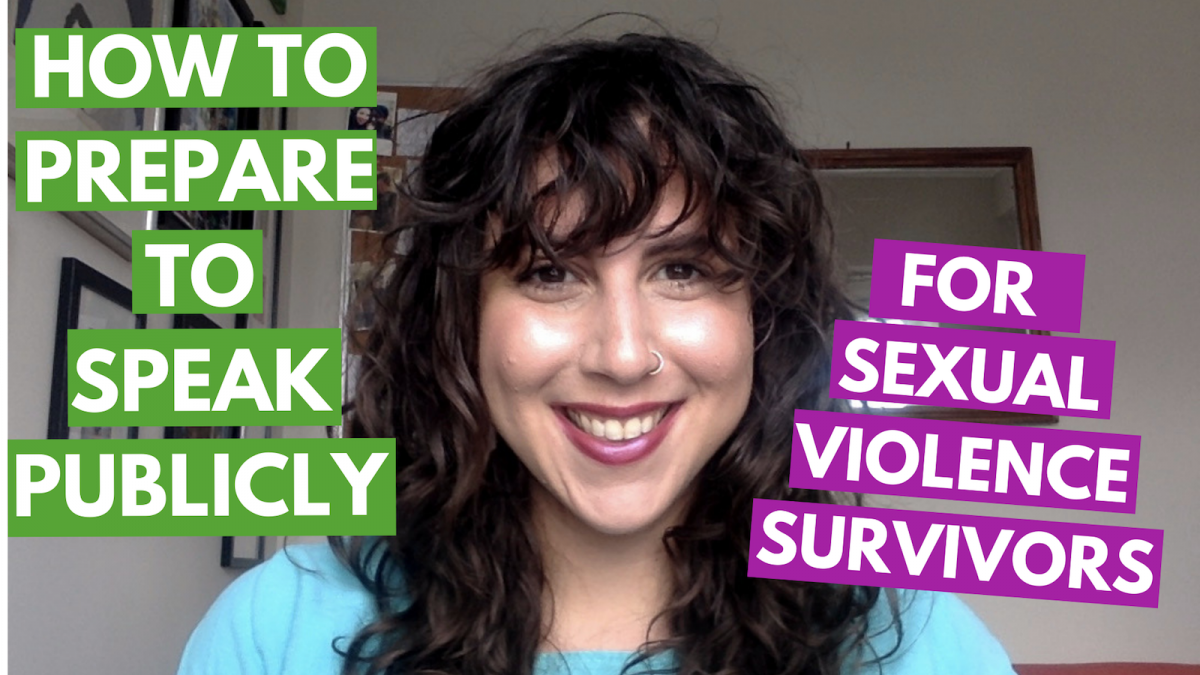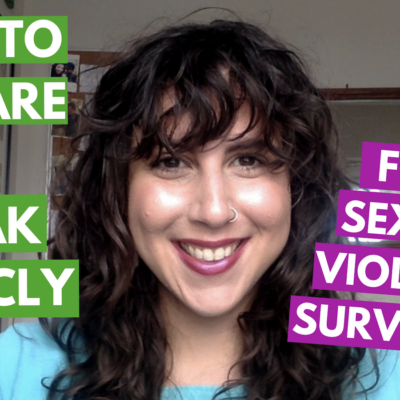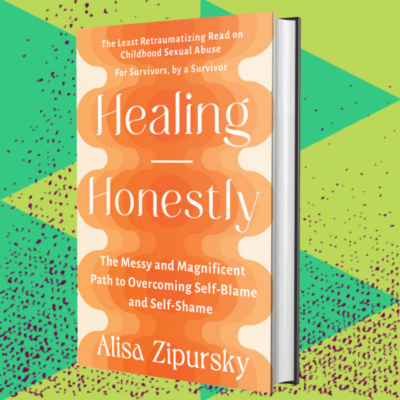This story does not describe any sexual violence
With more pressure than ever on sexual violence survivors to speak publicly about their trauma, I wanted to share with you all the four strategies I wish I had known when I first started speaking publicly several years ago. Top of that list is, hey if you don’t want to speak publicly, you don’t have to! You good! You owe no one nothing, you just need to listen to what your gut tells you is what you need. I get asked a lot from you awesome readers about tips and experiences I’ve been through that have helped teach me how to avoid some triggers and to keep myself healthy while telling strangers that I survived childhood sexual abuse, and it’s my pleasure now to share that with you!
You can watch my youtube video on it here, or read about it below!

Tip #1 You are in total control of your own story of surviving sexual violence
As someone who’s been speaking publicly about their survivorship and being a childhood sexual abuse survivor who was harmed by their father, I’ve learned some things along the way that I wish I had known four years ago when I first started. My first piece of advice is to remember that you are in complete and total control of your own story.
And I would encourage you to ask yourself why you want to be speaking publicly. I know that with the growing Me Too movement, there’s this pressure put on survivors right now that it’s our responsibility to speak out against the trauma that we’ve survived. And we hear all over on the news, on the internet, etc., people calling survivors to come forward brave and courageous.
Now, I don’t want to invalidate any of the courage and bravery of people who survived sexual trauma and want to speak publicly about it. But I think actually having this dominant narrative that survivors should be speaking publicly and that those that do are exalted to this hero status can actually be really harmful for survivors for whom their healing doesn’t include being public about what they’ve been through.
For some survivors, speaking publicly isn’t a part of their healing journey and that’s totally cool
That doesn’t make them any less of a survivor and it doesn’t make them any less courageous. Listen, surviving sexual trauma and living in the world, just getting through each day takes courage and bravery, and that’s enough. So it’s really important to remember that you’re in control of your own story and that your gut is going to tell you whether it’s time for you to disclose and share, whether it’s to one person or to a thousand people.
As long as we’re honoring that inner wisdom and expert within ourselves that tells us whether we want to share or not, then we’re going to be okay, we’re going to be okay. But it’s when we violate those voices that it can feel really difficult. And for those of us who are survivors, we spent so much time not feeling in control of what’s been happening to us that it’s particularly important that we center what makes us feel in control.
Tip #2 You decide how much you share, when and what you share about surviving sexual violence
If your gut does tell you that you want to be sharing publicly, know that you’re in total control of your story. You decide how much you share, when you want to share, what you’re sharing. That’s all for you. You absolutely can have whatever boundaries you want about things that you’re not going to talk about and that’s cool.
And I’ve had experiences where I’ve been in public settings and I was super open and I shared a whole bunch about my story. Then the next day was in a similar setting and for whatever reason, I felt a voice inside say, “I’m not going to tell you all about that part of me.” And that’s fine. What’s really important is that I’ve learned that sometimes I’ve pushed myself to share more than I feel comfortable and safe doing because in my head I think, “Well, logically, you know, I said this thing yesterday, I can say it again today.”
But it doesn’t matter. Sometimes we feel different each day and sometimes we feel different each minute. Our job is to honor those feelings, to protect those feelings within us, to acknowledge them and to live by them. Even though I might be on Teen Vogue talking about my father harming me, the next day maybe I don’t feel like sharing that with anyone in any way.
That is totally fine as long as I’m listening to my gut because trust me, violating those gut instincts, violating that inner wisdom, that has when the work has really, really triggered me.
Tip #3 You get to control your own tone when you talk about your story of sexual trauma and healing
Another point that I wish somebody had told me and I really had to learn this the hard way is that you get to control your own tone.
I was interviewed twice in one month. The first was a national TV network and the other was for a nonprofit led by survivors for survivors. During both interviews, when they began filming they had me start with saying my name and my survivorship. And so I said, “I’m Alisa Zipursky and I’m a survivor of child sex abuse at the hands of my father.”
And I smile the way that I smile because I feel like it and it’s just who I am. That’s what my survivorship and my healing looks like. In both instances the people who were directing were literally trying to trigger me to get me to express this darkness within me, to express the hardest parts of my trauma, and it felt really awful.
They were policing my tone and telling me that there’s one right way to be a survivor and I’m not it. It’s even worse for people who aren’t a white heterosexual woman like myself because they’re often not even offered the microphone to even get to share their stories and to have their stories be amplified.
It can be really difficult to know that even other survivors want you to sound a certain way and talk a certain way, and be this one kind of survivor that is actually sometimes like completely malaligned with who you feel you are that day, that moment in your healing, and in your life.
I’ve also gotten a lot of flack for using humor in my writing, so much so that I actually wrote a piece about it because I was tired of getting emails from people saying, “I don’t think you take what you’ve been through seriously enough because you use gifs and you make 30 Rock references.”
I responded saying, “You don’t get to police my tone, you don’t get to police how I survive, how I heal.” This is me.This is who I am. I like puppy videos and I like references to The Golden Girls. That’s it. So you get to choose your own tone whomever you are and however you show up that day.
And you might receive messages from people trying to fit you into this ideal as some mythic perfect survivor they have in their minds, but that is not your job. You be you. That’s more than enough.
Tip #4 Have boundaries!
Lastly, I wish somebody had told me that it’s okay to have boundaries and that you get to tell as much as you want to tell. It’s totally cool if things are off limits even if people are asking because they have really good intentions.
So I get thousands of emails from survivors all across the world and often they’re asking for advice. Sometimes they ask specifically about how I deal with certain relationships in my family or in my life. They’re asking because they themselves are struggling with that relationship in their own family, in their own lives. And sometimes I’m tempted to share with them about those things and then I remember, no, I’ve decided that I share so much of my life with my readers and that is totally okay.
It’s actually really healthy for me to have topics that I’m just never going to speak about publicly. Those are my boundaries and sometimes things shift a little. Sometimes I decide that I want to share something that three years ago I wasn’t going to talk about, but also the list grows. And as my life continues and it gets complicated, and it grows, and changes, I add more things to the list of stuff I’m not going to be talking about.
Whatever you want to share is a gift. You’re giving people a gift of your story. So however much of it you want to offer, it’s all a gift, it’s all a bonus. It is enough, and those boundaries are there to help keep us healthy, to help us prevent triggers that can happen when we’re speaking publicly about our trauma.

